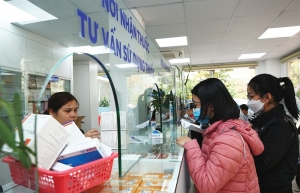INTERNATIONAL INVESTMENT
AND PORTAL
 Darrell Oh, Chairman Pharma Group Sector Committee
Darrell Oh, Chairman Pharma Group Sector Committee
The year 2025 marks a new potential chapter for Vietnam and the pharmaceutical industry, driven by significant legislative progress including amended resolutions and implementation of changes to the laws on pharma, health insurance, and tendering.
Regarding implementation of the Law on Pharmacy, we appreciate the ratification of key policies to fasten patient access to innovation and enable sustainable supply. If implemented effectively, these changes will support the national direction of fostering innovation while cutting bureaucracy and red tape.
Moving forward, the government should keep an eye on the guiding regulations to make sure they don’t introduce new administrative burdens or complexities – aligned with the goal of reducing admin procedures by 30 per cent. At the same time, there remains a strong need for faster adoption of digital solutions such as e-registration and e-labelling, which are also national priorities.
Vietnam has set a clear goal of becoming one of the top three investment destinations in ASEAN within the next 2-3 years. From the perspective of the innovative pharmaceutical industry, the country has significant potential to achieve this goal, particularly in high-value investments, as it was ranked as the second most promising ASEAN country for attracting research and development investment.
We outline key proposals to support Vietnam in achieving its ambitions by focusing on two critical areas: cultivating an innovation-friendly environment and enhancing the ease of doing business, and reforming health financing to match the pace of socioeconomic change via sustainable health financing solutions.
Firstly, to attract long-term investment from multinational corporations, particularly in the innovative pharmaceutical sector, prioritising and upholding intellectual property protection is essential, as it serves as the foundation for sustained innovation.
It is vital to ensure strict enforcement of intellectual property (IP) rights in the pharmaceutical sector. Particular care must be taken during the drafting of regulations guiding the new Law on Pharmacy to avoid unintentionally introducing risks to IP protection. A comprehensive review of IP-related regulations specific to the pharmaceutical industry is warranted.
Secondly, investing in health is investing for the future, thus addressing the fiscal gap in healthcare. The World Health Organization recommends that governments allocate more than 5 per cent of GDP to domestic general government health expenditure to ensure universal health coverage, reduce out-of-pocket costs, and strengthen health systems.
In addition, more frequent National Reimbursement Drug List updates are needed to align with global therapeutic innovation, respond to evolving disease burdens, and guarantee timely and equitable access for Vietnamese patients. Vietnam, similar to some other ASEAN countries, is not meeting this target. This is not a unique challenge. However, meeting the 5 per cent of GDP target is not just about funding but, rather, it is also a strategic investment.
Various solutions to address this fiscal gap can be adapted to a Vietnamese context, both through increased healthcare funding as well as increased efficiency in how that funding is used.
These health financing solutions include traditional funding methods such as supplementary health insurance, and allocation of revenue from products that are harmful to health, and alternative funding methods such as risk-sharing agreements, managed entry agreements.
For the immediate term, upon the amendment of the special consumption tax, revenue should be allocated from products that are harmful to health (if consumed excessively) towards the Health Insurance Fund. This should be allocated in the 2026 government budget.
Also helpful would be mobilising stakeholders for an agreed action plan to enable the increase in funding to the Health Insurance Fund within the fiscal headroom of the government and the roadmap towards the 5 per cent of GDP target by 2030.
A journey of a thousand miles begins with a single step. To fully unlock the country’s potential, we must turn good policies into effective implementation, strengthen IP protection, and rethink health financing models to ensure access and sustainability. The Pharma Group stands ready to be a committed, long-term partner in this journey, for a healthier and more resilient Vietnam.
 Pharmacy chain players change tack
Pharmacy chain players change tack
Pharmacy chains in Vietnam are venturing into uncharted territory as development space in the market becomes more limited.
 New doors will open with pharma legislation changes
New doors will open with pharma legislation changes
Since Vietnam became a member of the EU-Vietnam Free Trade Agreement in 2020, the country’s participation has impacted tariff reduction, marketing authorisation processes, business rights, and intellectual property rights protection within the pharmaceutical sector.



















